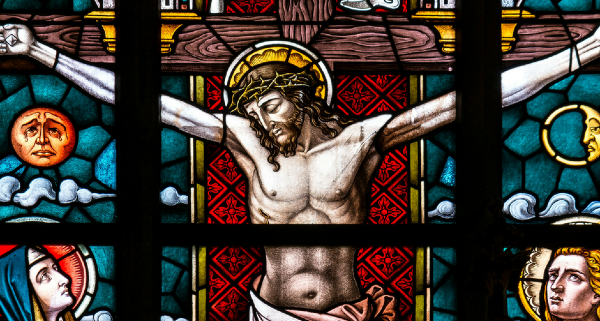 As we approach our most joyous celebration – the rising of our Savior, the first-fruits of eternal life, the opening of eternity for a mutinous creature – let’s take a moment and consider the cost...
As we approach our most joyous celebration – the rising of our Savior, the first-fruits of eternal life, the opening of eternity for a mutinous creature – let’s take a moment and consider the cost...
 As we approach our most joyous celebration – the rising of our Savior, the first-fruits of eternal life, the opening of eternity for a mutinous creature – let’s take a moment and consider the cost.
As we approach our most joyous celebration – the rising of our Savior, the first-fruits of eternal life, the opening of eternity for a mutinous creature – let’s take a moment and consider the cost.
No earthly torture will ever amount to the screaming schism as the Father looked away from the Son and restrained Himself from rescuing Him until the wrath was complete.
There are not enough words, not enough metaphors to describe this.
But there are some word-pictures that we might miss if we don’t examine the act of crucifixion on the God wrapped in flesh. The flogging, the nailing of beaten skin, the naked shame, the jeers as the prisoner gasped for life – opportunities for the most sadistic cruelty to emerge from man’s heart unchecked. We see that through the sinful judgment of man on God, that God absorbed the price of the sins of man.
 The Jewish people reserved crucifixion for anyone who betrayed his own people to a foreign enemy, sorcerers, and idolators (Josephus, Antiquities 13:41, Numbers 25:1-4, Deuteronomy 21:22-23, Mishnah, Sanhedrin 6.5) How ironic that the Jewish people betrayed their God to a foreign enemy (Luke 23:6-16) and accused Him of being in league with a demon (John 10:33) as well as blasphemy that accorded this death sentence (Mark 14:64).
The Jewish people reserved crucifixion for anyone who betrayed his own people to a foreign enemy, sorcerers, and idolators (Josephus, Antiquities 13:41, Numbers 25:1-4, Deuteronomy 21:22-23, Mishnah, Sanhedrin 6.5) How ironic that the Jewish people betrayed their God to a foreign enemy (Luke 23:6-16) and accused Him of being in league with a demon (John 10:33) as well as blasphemy that accorded this death sentence (Mark 14:64).
The Romans adopted the practice of crucifixion as the supreme penalty for specific instances. It was executed upon lower classes, in wartime, and upon slaves.
Consider this:
- Crucifixion was thought to deter slaves from insurrection. It was rare for a slave to have protection from his master. But Jesus was actually the Master who was betrayed by His servants (Mark 12:1-10).
- Crucifixion was used to break the will of a conquered people by the conquerors. This act of conquest is used by God to bring freedom (Galatians 3:10-13).
- Crucifixion was used for crimes of high treason (Luke 23:2-3). Jesus is the true King of all the kings (Matthew 26:64). The kings of the earth will answer to Him (Psalm 2:2, Revelation 1:5).
- Crucifixion was used in contexts of war. And yet, when Jesus submitted to it, He brought peace (Isaiah 53:7).
- Perhaps most shockingly, crucifixion was used for religions that were not condoned by the earthly government. It was the true God that man dared to execute judgment on! (John 1:1-18)
That night, the apostles were in despair. They were terrified, confused, discouraged and unsure. But what looked like the worst evening in the history of mankind was the most wonderful loving act for them.
 In Acts 2, Peter explains it eloquently by reminding them of the words of the long-ago prophets and then explaining,
In Acts 2, Peter explains it eloquently by reminding them of the words of the long-ago prophets and then explaining,
“22 “Men of Israel, hear these words: Jesus of Nazareth, a man attested to you by God with mighty works and wonders and signs that God did through him in your midst, as you yourselves know— 23 this Jesus, delivered up according to the definite plan and foreknowledge of God, you crucified and killed by the hands of lawless men. 24 God raised him up, loosing the pangs of death because it was not possible for him to be held by it.” Acts 2:22-24
The response of the crowd echoes into our own souls, “What shall we do?” (Acts 2:37). For, if we are honest with ourselves, we, too have betrayed God. We too, commit high treason when we reject His authority over our lives. But Peter’s plea for repentance is our incredible privilege as we recognize that He is perfecting the work of sanctification in us.
So, what does this mean for you and for me? If Jesus is our Savior, if we embrace the atoning work that He endured on our behalf, what now?
The answer is in Luke 9:23-27,
“23 And he said to all, “If anyone would come after me, let him deny himself and take up his cross daily and follow me. 24 For whoever would save his life will lose it, but whoever loses his life for my sake will save it. 25 For what does it profit a man if he gains the whole world and loses or forfeits himself? 26 For whoever is ashamed of me and of my words, of him will the Son of Man be ashamed when he comes in his glory and the glory of the Father and of the holy angels. 27 But I tell you truly, there are some standing here who will not taste death until they see the kingdom of God.”
If you are prayerfully considering what this might look like in your life, I would encourage you to pray through Philippians 2:6-11 and 1 Corinthians 1:20-25.
May He bless you as you seek His face and celebrate the awesome work of resurrection this Sunday! He is risen indeed!
Reference: Hengel, Martin “Crucifixion” Fortress Press, 1977


 As we approach our most joyous celebration – the rising of our Savior, the first-fruits of eternal life, the opening of eternity for a mutinous creature – let’s take a moment and consider the cost...
As we approach our most joyous celebration – the rising of our Savior, the first-fruits of eternal life, the opening of eternity for a mutinous creature – let’s take a moment and consider the cost...

 This is my third time in Bolivia. If you would have told me 10 years ago that I would spend my vacation time each year to visit people in need and work with the less fortunate, I'm not sure I would have believed you. But God placed Bolivia on my heart from the very first trip I made, one of the ways He did that was through working with the women of the community.
This is my third time in Bolivia. If you would have told me 10 years ago that I would spend my vacation time each year to visit people in need and work with the less fortunate, I'm not sure I would have believed you. But God placed Bolivia on my heart from the very first trip I made, one of the ways He did that was through working with the women of the community.

 In a survey of students at a prominent mid-western university, 67% claimed to be of the Christian faith. When those surveyed were asked what they first thought of when Easter was mentioned, what do you think they answered?...
In a survey of students at a prominent mid-western university, 67% claimed to be of the Christian faith. When those surveyed were asked what they first thought of when Easter was mentioned, what do you think they answered?...

 In this day and age we are flooded with information. However, with allegations of fake news and spin doctoring it is hard to know what to believe. Nevertheless, people still want to know, they want answers. This is particularly the case during the Easter Holiday, a time when society is faced with questions about religion: who was Christ, what do these traditions mean, is there something for me in religion...
In this day and age we are flooded with information. However, with allegations of fake news and spin doctoring it is hard to know what to believe. Nevertheless, people still want to know, they want answers. This is particularly the case during the Easter Holiday, a time when society is faced with questions about religion: who was Christ, what do these traditions mean, is there something for me in religion...

 Sometimes I feel like I’ll be a student forever. If I have it my way, I’m signing up for as much school as any person can attend in their life. I’ve already been a student for 17 years, so although I don’t know everything, I have some experience in the crazy and sometimes erratic phase of “studenthood.”
Sometimes I feel like I’ll be a student forever. If I have it my way, I’m signing up for as much school as any person can attend in their life. I’ve already been a student for 17 years, so although I don’t know everything, I have some experience in the crazy and sometimes erratic phase of “studenthood.”
 The Jewish people reserved crucifixion for anyone who betrayed his own people to a foreign enemy, sorcerers, and idolators (Josephus, Antiquities 13:41,
The Jewish people reserved crucifixion for anyone who betrayed his own people to a foreign enemy, sorcerers, and idolators (Josephus, Antiquities 13:41,  In
In 

 Three years later, my heart filled with love, grace and humility as I witnessed the same community with many more members of the Cascada group open their Nutrition Center. Though the building was awesome, it was the pride each women had in their work. The ownership, responsibility and confidence each woman had filled my heart. The women have learned and are bringing the good information to others. All the while, living and learning biblical principles. Their children are learning from their mothers and will be leaders one day too!
Three years later, my heart filled with love, grace and humility as I witnessed the same community with many more members of the Cascada group open their Nutrition Center. Though the building was awesome, it was the pride each women had in their work. The ownership, responsibility and confidence each woman had filled my heart. The women have learned and are bringing the good information to others. All the while, living and learning biblical principles. Their children are learning from their mothers and will be leaders one day too!  If you count Church, Christ and Resurrection together, that adds up to just 36%. Compared to Easter eggs and the Easter bunny adding up to whopping 42%. Wow!
If you count Church, Christ and Resurrection together, that adds up to just 36%. Compared to Easter eggs and the Easter bunny adding up to whopping 42%. Wow!

 There is no better example than the two men journeying to Emmaus (
There is no better example than the two men journeying to Emmaus (


 been, “when will I ever use this (referring to the Pythagorean theorem, the Bill of Rights, or whatever we’re learning at the time) in real life?” I know I’ve said that more than my fair share of times. And let’s face it, I haven’t used the Pythagorean theorem since 10th grade! So there’s that.
been, “when will I ever use this (referring to the Pythagorean theorem, the Bill of Rights, or whatever we’re learning at the time) in real life?” I know I’ve said that more than my fair share of times. And let’s face it, I haven’t used the Pythagorean theorem since 10th grade! So there’s that.